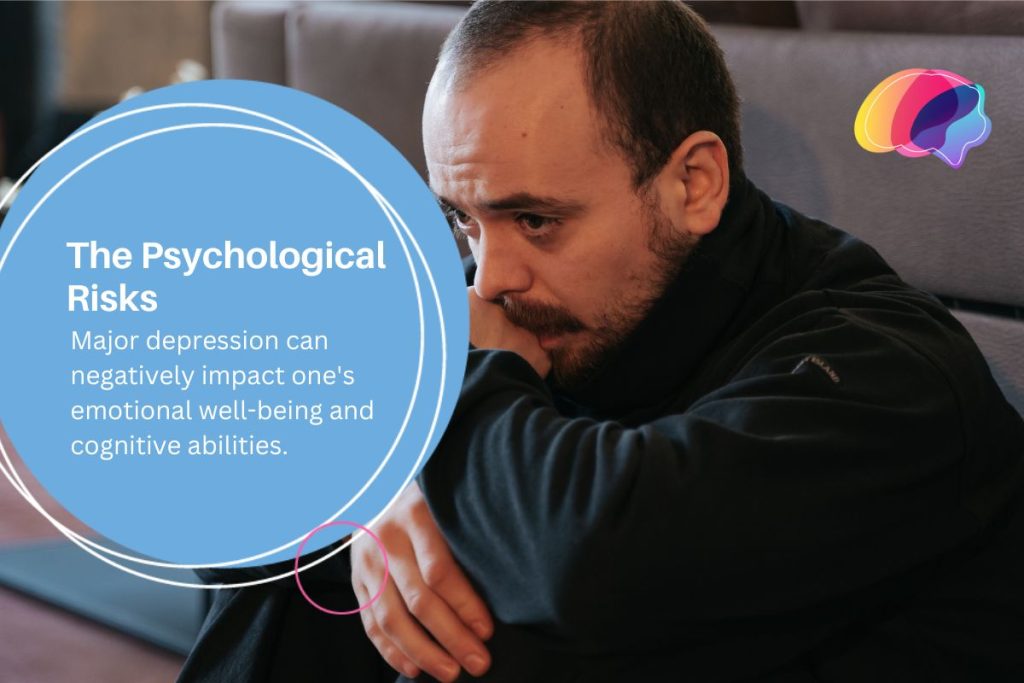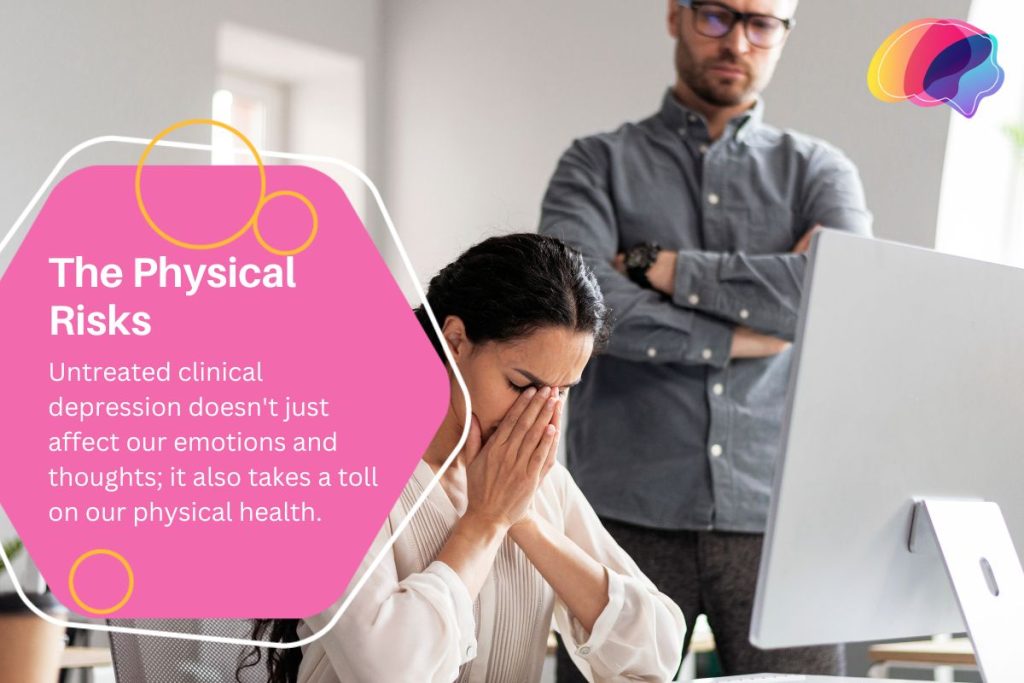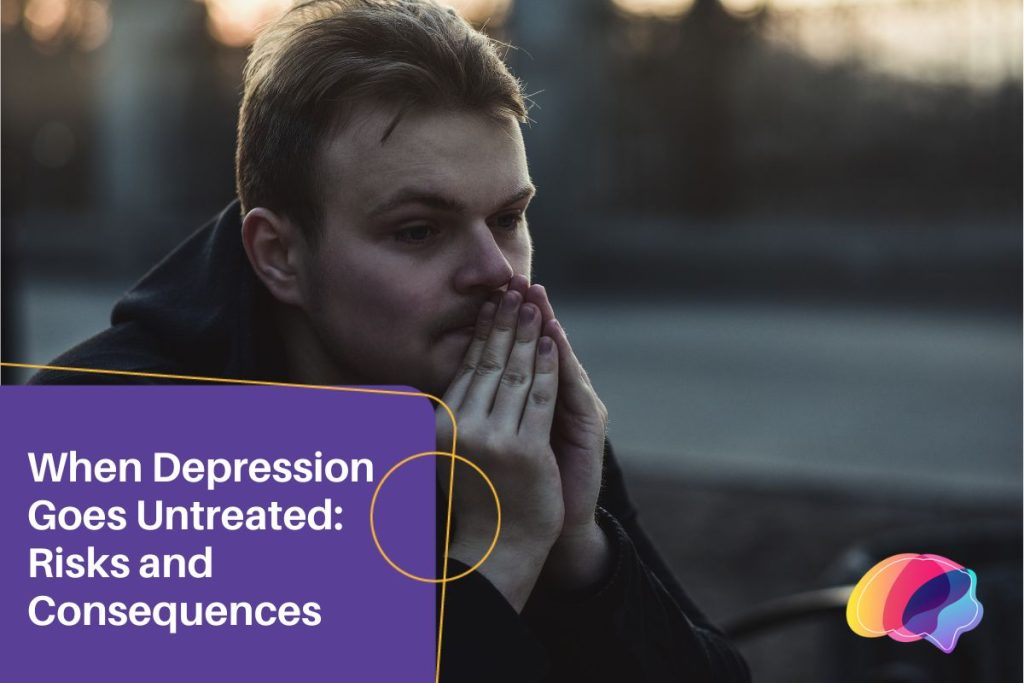Depression is a common mental health condition that affects how you feel, think, and act. It can cause persistent sadness, loss of interest, hopelessness, and other symptoms that interfere with daily life.
Clinical or major depression isn’t a sign of weakness or a character flaw. Rather, it’s a treatable condition that’s manageable with the help of a mental health professional.
Unfortunately, many people who suffer from clinical depression don’t seek or receive the treatment they need. This can have serious and lasting consequences for their physical and mental health, as well as their relationships, work, and quality of life.
The Prevalence of Untreated Depression
According to the World Health Organization (WHO), more than 280 million people worldwide have clinical depression. However, only about half of them receive treatment for their condition.
In some countries, this figure is as low as 10%. The reasons for this can be lack of awareness, stigma, cost, access and availability of services, and personal barriers such as fear, shame, or denial.
Some groups are also more likely to suffer from untreated depression than others. These include women, older adults, adolescents, people with chronic illnesses, people who have experienced trauma or abuse, people who live in poverty or conflict zones, and people who belong to marginalized communities.
Untreated depression can also affect family members and caregivers of people with mental disorders, as they may experience stress, burnout, isolation, and emotional distress.
The Psychological Risks
Major depression can negatively impact one’s emotional well-being and cognitive abilities.
Some of the psychological risks of untreated depression are:
Emotional Deterioration
Depression left untreated may cause emotional deterioration, causing individuals to experience increased sadness, hopelessness, and a persistent sense of despair.
People with untreated depression often feel overwhelmed by these negative emotions, making it difficult to enjoy life or activities they once loved.
Loss of Interest in Activities
One of the hallmark symptoms of depression is the loss of interest in once-enjoyable activities.
When depression goes untreated, this symptom can become more pronounced, leading to a lack of motivation to engage in hobbies, social interactions, or even daily responsibilities that can further contribute to feelings of isolation and loneliness.
Cognitive Impairment
Major depressive disorder doesn’t just affect emotions; it can also impair cognitive functioning. People with untreated depression often experience difficulty concentrating and making decisions.
This cognitive fog can impact various aspects of life, from work or school performance to managing daily tasks effectively.
Actual Suicide Attempts
Tragically, untreated depression can escalate to the point where individuals self-harm or attempt suicide. This is a life-threatening outcome that requires urgent intervention.
Suicidal attempts are not a cry for attention but a sign of immense suffering and despair. According to the World Health Organization, depression is the leading cause of suicide worldwide, and more than 700,000 people die by suicide every year.
Anyone who has attempted suicide or is at risk of doing so needs immediate professional help.

The Physical Risks
Untreated clinical depression doesn’t just affect our emotions and thoughts; it also takes a toll on our physical health.
Here are some of the physical risks that can arise from untreated depression.
Sleep Disorders
Depression often disrupts sleep patterns, leading to two common sleep disorders: insomnia and hypersomnia.
Insomnia is when people struggle to fall asleep or stay asleep, while hypersomnia is characterized by excessive sleepiness during the day and prolonged sleep at night.
These sleep disturbances can exacerbate depressive symptoms and negatively impact overall well-being.
Impact on Overall Health
The physical health of individuals with untreated depression is also at risk. Depression can contribute to various health problems, including chronic conditions such as heart disease and diabetes.
The connection between depression and these physical illnesses is thought to be linked to changes in brain chemistry and the body’s inflammatory response.
Nutritional Deficiencies
Changes in appetite are another hallmark of depression, and they can vary from person to person. Some individuals may lose their appetite, leading to weight loss, while others may overeat, resulting in weight gain.
Both scenarios can lead to nutritional deficiencies, as the body may not receive the essential nutrients it needs to function optimally. This can further worsen physical and mental health.
Weakened Immune System
Untreated depression can weaken the immune system, making individuals more susceptible to illnesses. It can compromise the body’s ability to fight infections, leaving them at risk for frequent illnesses.
Additionally, when someone with depression gets sick, their recovery time may be prolonged compared to those without depression.

Social and Economic Consequences
Untreated clinical depression can also cast a shadow over your relationships, work, and daily life.
Here are some of the possible social and economic consequences of depression left untreated:
Strained Relationships
Depression can strain the bonds you share with family and friends. It can be challenging for them to understand and support someone grappling with untreated depression.
This disconnect can cause feelings of isolation and loneliness, exacerbating depression symptoms. Social withdrawal is a common outcome, as individuals may find it increasingly difficult to engage in social interaction.
Impact on Family and Friendships
Loved ones often feel helpless as they witness someone suffering from untreated depression. This can lead to both parties’ frustration, tension, and emotional exhaustion.
Communication breakdowns and emotional distance are not uncommon in these situations.
Job and Academic Performance
Depression can also infiltrate your work or academic life. Lost productivity and difficulty concentrating are frequent symptoms of declining job performance or academic achievements.
This, in turn, increases the risk of job loss or academic failure, compounding the challenges individuals face.
Long-Term Consequences
People with depression may not seek treatment for various reasons. They may not recognize the symptoms of depression, or they may think that they can cope on their own. They may also face barriers such as stigma, cost, or lack of access to mental health services.
However, untreated depression can have serious and long-term consequences, such as:
Chronic Health Issues
Persistent untreated depression can contribute to chronic health issues. This includes an increased risk of developing or worsening chronic medical conditions such as heart disease, diabetes, and coronary heart disease.
Lower Quality of Life
Depression affects a person’s ability to enjoy life, pursue goals, and maintain relationships. This mental health condition can also impair a person’s cognitive skills.
People with depression may experience lower self-esteem, productivity, and life satisfaction, especially if left untreated.
Financial Burden
Depression can result in lost income, increased medical expenses, and reduced work performance.
Job loss or decreased work productivity can lead to financial instability, adding another layer of stress to an already challenging situation.
According to the National Institute of Mental Health (NIMH), depression costs the U.S. economy about $362.2 billion annually in direct and indirect costs.
The cost of seeking treatment for depression is often far less than the long-term financial burden that untreated depression can impose.

Treatment for Depression
The good news is that there are effective treatment options for clinical depression that can help individuals regain control of their lives.
Depression treatment typically falls into three main categories: medication, therapy, and lifestyle changes.
Depending on the severity and type of depression, a person may benefit from one or a combination of these treatments.
Medication
Antidepressants can help balance the brain chemicals that affect mood and emotions. However, while they can be effective, they may also have side effects. These can include nausea, dizziness, weight changes, and sexual dysfunction.
Therefore, it is important to consult a psychiatrist before taking any antidepressant and to follow their instructions carefully.
Therapy
Therapy is a form of psychological treatment where you talk to a trained professional about your thoughts, feelings, and behaviors.
Talk therapy includes cognitive-behavioral therapy (CBT), interpersonal therapy (IPT), psychodynamic therapy, and family therapy.
Each type focuses on different aspects of depression and emotional well-being.
Talk therapy can help you understand the causes of your mental disorder, cope with its symptoms, and change your negative thoughts and actions.
Lifestyle Changes
Lifestyle changes are actions a person can take to improve their physical and mental well-being. Some examples of lifestyle changes that may prevent depression or assist with treatment are:
Establishing healthy sleep habits
Stress management techniques (like meditation and mindfulness)
Lifestyle changes can significantly complement medication and therapy and help boost mood, reduce stress, and increase overall well-being.
Unlock a Brighter Future with Lucid Wellness Center
At Lucid Wellness Center in Los Angeles, CA, we know that not everyone responds to traditional mental health treatments. That’s why we’re pioneering a mental health revolution with cutting-edge approaches to care.
If you or a loved one are struggling with treatment-resistant depression, anxiety disorders, or other mental health challenges, we offer innovative techniques like TMS therapy.
Our commitment to compassionate, research-backed treatment means you don’t have to lose hope.
Contact us today to explore the latest in mental health care and find relief.
Frequently Asked Questions (FAQs) about Risk and Consequences of Untreated Depression
What Happens to Untreated Depression?
Untreated depression can exacerbate symptoms, leading to severe emotional distress and an increased risk of self-harm or suicide. It may also contribute to developing other mental disorders, substance abuse, and chronic physical illnesses.
How Does Untreated Depression Affect the Brain?
Untreated depression can disrupt brain chemistry, affecting mood regulation and cognitive function. Brain structure and function changes may contribute to symptoms such as memory problems and difficulty concentrating.
What Are 5 Complications That Can Result From Untreated Depression?
Untreated depression can lead to suicidal thoughts, chronic illnesses, substance abuse, social isolation, and impaired work or academic performance.
How Can Untreated Depression Affect a Person’s Relationships?
Untreated depression often results in emotional distance, irritability, and social withdrawal, straining relationships with friends and family.
What Are the Risks of Untreated Depression During Pregnancy?
The risks of untreated depression during pregnancy include
preterm birth, low birth weight, and potential developmental issues in the child.
How Can Untreated Depression Lead to Other Mental Health Issues?
Untreated depression may contribute to anxiety disorders, substance abuse, and the development of other mental disorders as individuals use unhealthy coping mechanisms.
What Are Some Physical Health Issues Associated With Untreated Depression?
Untreated depression is associated with an increased risk of physical illnesses, weakened immunity, sleep disturbances, weight changes, and chronic inflammation, affecting overall well-being.
Sources:
- “Depressive Disorder (Depression).” www.who.int, 31 Mar. 2023, www.who.int/news-room/fact-sheets/detail/depression#:~:text=An%20estimated%203.8%25%20of%20the,world%20have%20depression%20(1).
Greenberg, Paul E., et al. “The Economic Burden of Adults With Major Depressive Disorder in the United States (2010 and 2018).” PharmacoEconomics, vol. 39, no. 6, Springer Science and Business Media LLC, May 2021, pp. 653–65. Crossref, https://doi.org/10.1007/s40273-021-01019-4.
Hofmann, Stefan G., et al. “The Efficacy of Cognitive Behavioral Therapy: A Review of Meta-analyses.” Cognitive Therapy and Research, vol. 36, no. 5, Springer Science and Business Media LLC, July 2012, pp. 427–40. Crossref, https://doi.org/10.1007/s10608-012-9476-1.
Moncrieff, Joanna, et al. “The Serotonin Theory of Depression: A Systematic Umbrella Review of the Evidence.” Molecular Psychiatry, 2022, pp. 1-14, https://doi.org/10.1038/s41380-022-01661-0. Accessed 6 Sept. 2023.
“Suicide.” www.who.int, 28 Aug. 2023, www.who.int/news-room/fact-sheets/detail/suicide.
Thornicroft, Graham, et al. “Undertreatment of People with Major Depressive Disorder in 21 Countries.” The British Journal of Psychiatry, vol. 210, no. 2, 2017, pp. 119-124, https://doi.org/10.1192/bjp.bp.116.188078. Accessed 6 Sept. 2023.


